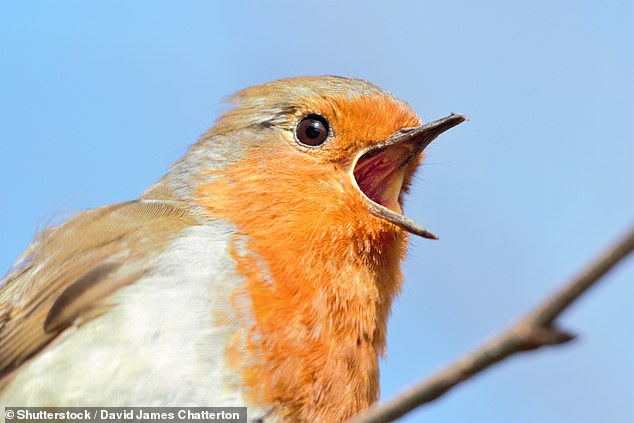Living near more bird species can increase life satisfaction as much as having a pay rise
- Past research has suggested that expose to nature is good for mental health
- German researchers analysed data on the life satisfaction of 26,000 adults
- They compared this with the biodiversity in the areas in which the people lived
- They said 14 new local bird species is as good as getting £1,344 more a year
People get just as much extra life satisfaction from living in area with plenty of bird species as they do from getting a pay raise, a study has claimed.
Many past small-scale studies have suggested that exposure to nature is good for one’s mental health — and the current pandemic has raised interest in the outdoors.
Experts from Germany cross-referenced survey data on the life satisfaction of thousands of adults from across Europe with their exposure to nature.
They concluded that having 14 new bird species in the local area provides equal pleasure as been awarded a £1,344 annual raise.
People get just as much extra life satisfaction from living in area with plenty of bird species as they do from getting a pay raise, a study has claimed. Pictured,
‘Europeans are particularly satisfied with their lives if their immediate surroundings host a high species diversity,’ said paper author and ecologist Joel Methorst of the Senckenberg Biodiversity and Climate Research Centre.
‘According to our findings, the happiest Europeans are those who can experience numerous different bird species in their daily life, or who live in near-natural surroundings that are home to many species.’
In their study, Mr Methorst and colleagues compared data on the reported quality of life of more than 26,000 adults from across Europe with the diversity of bird species in each subject’s local area.
Birds, the researchers explained, are a good indicator of overall biological diversity and the availability of green spaces and water — and are one of the most noticeable and animate aspects of nature, especially in more urbanised settings.
‘We also examined the socio-economic data of the people that were surveyed,’ explained paper author and biologist Katrin Böhning-Gaese, also of the Senckenberg Biodiversity and Climate Research Centre.
‘Much to our surprise, we found that avian diversity is as important for their life satisfaction as is their income,’ she added.
In fact, the team found that having 14 additional bird species in the local area gave as much satisfaction as an annual salary raise of £1,344 raise would to someone on a annual income of £13,380.
Nature, the researchers conclude, is important to the public’s well-being.
‘Biological diversity is currently undergoing a dramatic decline. This poses the risk that human well-being will also suffer from an impoverished nature,’ noted Mr Methorst.
‘Nature conservation therefore not only ensures our material basis of life, but it also constitutes an investment in the well-being of us all,’ he concluded.
The full findings of the study were published in the journal Ecological Economics.
